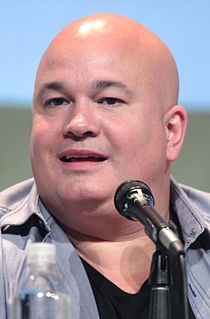A Quote by Robert Kelly
We sleep in language if language does not come to wake us up with its strangeness.
Related Quotes
Religion is much more than language, but to be Christian does mean speaking Christian for most people. The language many of us use has contributed to the crisis in Christianity in North America. Traditional Christian language is becoming less familiar to millions of people. The language is frequently misunderstood by people.
We believe we can also show that words do not have exactly the same psychic "weight" depending on whether they belong to the language of reverie or to the language of daylight life-to rested language or language under surveillance-to the language of natural poetry or to the language hammered out by authoritarian prosodies.
Language changes. If it does not change, like Latin it dies. But we need to be aware that as our language changes, so does our theology change, particularly if we are trying to manipulate language for a specific purpose. That is what is happening with our attempts at inclusive language, which thus far have been inconclusive and unsuccessful.
She alone dares and wishes to know from within, where she, the outcast, has never ceased to hear the resonance of fore language. She lets the other language speak - the language of 1,000 tongues which knows neither enclosure nor death. To life she refuses nothing. Her language does not contain, it carries; it does not hold back; it makes possible.
We live in a world filled with language. Language imparts identity, meaning, and perspective to our human community. Writers are either polluters or part of the clean-up team. Just as the language of power and greed has the potential to destroy us, the language of reason and empathy has the power to save us. Writers can inspire a kinder, fairer, more beautiful world, or invite selfishness, stereotyping, and violence. Writers can unite people or divide them.
It has not been definitively proved that the language of words is the best possible language. And it seems that on the stage, which is above all a space to fill and a place where something happens, the language of words may have to give way before a language of signs whose objective aspect is the one that has the most immediate impact upon us.
There are those who wake up each morning to conquer the day, and then there are those of us who wake up only because we have to. We live in the shadow of every neighborhood. We own little corner stores, live in run-down apartments that get too little light, and walk the same streets day after day. We spend our afternoons gazing lazily out of windows. Somnambulists, all of us. Someone else said it better: we wake to sleep and sleep to wake.


































